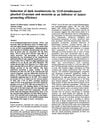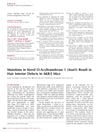 348 citations,
July 2017 in “Skin appendage disorders”
348 citations,
July 2017 in “Skin appendage disorders” Platelet-rich plasma shows promise for skin and hair treatments but needs more research and standardization.
 147 citations,
January 2003 in “American journal of clinical dermatology”
147 citations,
January 2003 in “American journal of clinical dermatology” The document concludes that accurate diagnosis of ichthyosis is crucial for treatment and genetic advice, and ongoing research is needed for better therapies.
 134 citations,
April 2020 in “Journal of Cosmetic Dermatology”
134 citations,
April 2020 in “Journal of Cosmetic Dermatology” Male pattern hair loss could hint at androgens affecting COVID-19 severity.
 77 citations,
July 2020 in “European Journal of Clinical Pharmacology”
77 citations,
July 2020 in “European Journal of Clinical Pharmacology” Blocking the virus's entry into cells by targeting certain pathways could lead to early COVID-19 treatments.
 77 citations,
January 1980 in “Carcinogenesis”
77 citations,
January 1980 in “Carcinogenesis” TPA is about 50 times more effective at promoting tumors than MZ.
 75 citations,
May 2013 in “Journal of the American Academy of Dermatology”
75 citations,
May 2013 in “Journal of the American Academy of Dermatology” Zinc deficiency in children can cause skin issues and can be serious if not diagnosed and treated properly.
 64 citations,
November 2012 in “EMBO reports”
64 citations,
November 2012 in “EMBO reports” Lamins are vital for cell survival, organ development, and preventing premature aging.
 59 citations,
July 2015 in “Journal of Immunology”
59 citations,
July 2015 in “Journal of Immunology” Certain proteins, caspases-1 and -11, are important in the early development of skin inflammation in mice.
 58 citations,
December 2020 in “Mayo Clinic Proceedings”
58 citations,
December 2020 in “Mayo Clinic Proceedings” The conclusion is that individual differences in COVID-19 severity are influenced by factors like age, sex, race, and genetics, which are important for personalized medicine.
 54 citations,
November 2015 in “Methods in enzymology on CD-ROM/Methods in enzymology”
54 citations,
November 2015 in “Methods in enzymology on CD-ROM/Methods in enzymology” Keratins are important for skin cell health and their problems can cause diseases.
 52 citations,
October 2010 in “Antiviral Therapy”
52 citations,
October 2010 in “Antiviral Therapy” New treatments for Hepatitis C show promise but need more research to confirm their safety and effectiveness for clinical use.
 49 citations,
January 2021 in “Journal of The European Academy of Dermatology and Venereology”
49 citations,
January 2021 in “Journal of The European Academy of Dermatology and Venereology” Anti-androgens, like finasteride, dutasteride, and spironolactone, may lessen the severity of COVID-19 in men, leading to fewer ICU admissions.
 47 citations,
April 2020 in “Dermatologic Therapy”
47 citations,
April 2020 in “Dermatologic Therapy” Androgenetic alopecia linked to COVID-19 severity; drugs reducing androgen receptor activation may help.
 47 citations,
March 2016 in “Journal of dermatology”
47 citations,
March 2016 in “Journal of dermatology” Understanding the genetics of rare inherited ichthyosis syndromes is key for better treatments and genetic counseling.
 42 citations,
January 2007 in “Pediatric dermatology”
42 citations,
January 2007 in “Pediatric dermatology” Low-potency steroids can cause serious side effects in people with skin conditions like Netherton syndrome.
 36 citations,
November 2020 in “Journal of The European Academy of Dermatology and Venereology”
36 citations,
November 2020 in “Journal of The European Academy of Dermatology and Venereology” 5-alpha-reductase inhibitors may reduce COVID-19 symptoms in bald males.
 36 citations,
July 2020 in “Frontiers in Medicine”
36 citations,
July 2020 in “Frontiers in Medicine” Spironolactone might help protect against severe lung problems in COVID-19 patients.
 34 citations,
September 2020 in “BMC Endocrine Disorders”
34 citations,
September 2020 in “BMC Endocrine Disorders” Existing drug dexamethasone may lower death risk in severe COVID-19 cases; more research needed for other drugs.
 32 citations,
July 2020 in “Journal of The American Academy of Dermatology”
32 citations,
July 2020 in “Journal of The American Academy of Dermatology” AGA linked to worse COVID-19 outcomes in men.
 29 citations,
May 2018 in “Clinical Endocrinology”
29 citations,
May 2018 in “Clinical Endocrinology” Recent genetic insights show that low-renin hypertension includes a range from essential hypertension to secondary or familial forms, affecting diagnosis and treatment.
 28 citations,
April 2010 in “British Journal of Dermatology”
28 citations,
April 2010 in “British Journal of Dermatology” Genetic marker rs12558842 strongly linked to male hair loss.
 27 citations,
October 2020 in “Experimental Dermatology”
27 citations,
October 2020 in “Experimental Dermatology” Having a lot of gray hair and hair loss are linked to more severe COVID-19.
 26 citations,
September 2020 in “Journal of the European Academy of Dermatology and Venereology”
26 citations,
September 2020 in “Journal of the European Academy of Dermatology and Venereology” A certain genetic variant in the androgen receptor may predict the severity of COVID-19 in men.
 23 citations,
June 2010 in “Journal of Investigative Dermatology”
23 citations,
June 2010 in “Journal of Investigative Dermatology” A mutation in the Soat1 gene causes hair structure defects and other health issues in AKR/J mice.
 22 citations,
June 2018 in “Journal of Neuroinflammation”
22 citations,
June 2018 in “Journal of Neuroinflammation” Procyanidins from grape seeds reduce nerve pain by blocking specific proteins and inflammation.
 21 citations,
January 2021 in “Therapeutic Advances in Endocrinology and Metabolism”
21 citations,
January 2021 in “Therapeutic Advances in Endocrinology and Metabolism” Testosterone may have a dual role in COVID-19, potentially worsening outcomes in men, and testosterone therapy could help some patients, but more research is needed.
 16 citations,
January 2000 in “The Journal of clinical endocrinology and metabolism/Journal of clinical endocrinology & metabolism”
16 citations,
January 2000 in “The Journal of clinical endocrinology and metabolism/Journal of clinical endocrinology & metabolism” Antiandrogen drugs can reduce PSA levels in women with excess hair, suggesting PSA is a sign of male hormone activity in women.
 15 citations,
August 2021 in “Reviews in endocrine and metabolic disorders”
15 citations,
August 2021 in “Reviews in endocrine and metabolic disorders” COVID-19 and hypopituitarism (reduced pituitary gland function) are linked, with the latter's related health issues potentially worsening COVID-19 outcomes, and COVID-19 possibly increasing risk for pituitary complications.
 9 citations,
April 2021 in “Expert opinion on pharmacotherapy”
9 citations,
April 2021 in “Expert opinion on pharmacotherapy” Clascoterone is a new, effective, and safe acne treatment without systemic side effects.
 9 citations,
March 2021 in “Hormones”
9 citations,
March 2021 in “Hormones” COVID-19 may affect male fertility and women might have better outcomes due to hormonal and immune differences.






























